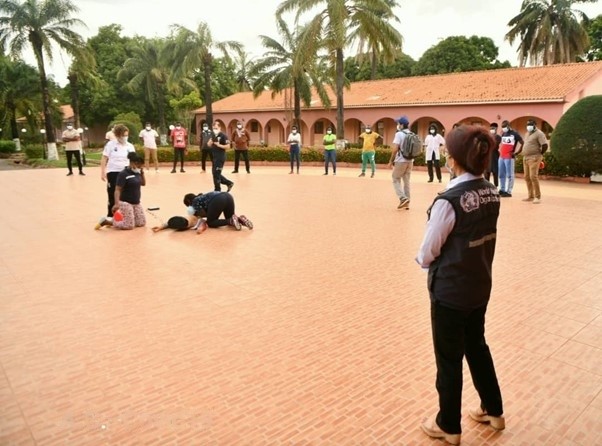
- Report -

Ukraine
Making every school a health-promoting school: global standards and indicators
author




- Improved access to quality essential health services irrespective of gender, age or disability status
- Countries enabled to provide high-quality, people-centred health services, based on primary health care strategies and comprehensive essential service packages
- Health emergencies rapidly detected and responded to
Improving readiness to respond to health emergencies through an integrated ambulance network in Guinea-Bissau
Prior to the COVID-19 pandemic, Guinea-Bissau's health system lacked an ambulance network for patient transportation and emergency assistance. Many of the ambulances that had been allocated to the various health regions had fallen into disrepair, rendering them unusable. Even those that were still in good working condition were expensive to maintain, with costs that far exceeded the national minimum wage. This meant that the most urgent cases were unable to seek health care quickly and efficiently. To improve access to health care for the estimated two million people in Guinea-Bissau, the government partnered with the World Health Organization (WHO) to establish the Integrated Network of Ambulances, Rede Integrada de Ambulâncias (RIA). This led to ambulances being fully equipped and staffed with highly trained and qualified medical personnel, with, on average, 15 interhospital transfers and 5 prehospital transfers completed every day. Services are now available to all two million citizens of Guinea-Bissau around the clock and can be accessed by calling the free emergency line 112. With the introduction of the RIA, individuals in affected regions have been able to access health care with greater ease.
Key WHO Contributions
Provision of technical support for Emergency Care Systems Assessment (ECSA)
Facilitation and contextualizing of best practices from other countries
Resource mobilization for procurement of ambulances
Conduct of training sessions linked to emergency care.
How did Guinea-Bissau, with the support of the WHO Secretariat, achieve this?
During the COVID-19 pandemic, it became evident that Guinea-Bissau’s emergency care system needed to be strengthened to provide adequate treatment for severe cases. To identify specific areas for improvement, WHO Guinea-Bissau provided technical support to the Ministry of Health (MoH) to conduct a WHO Emergency Care Systems Assessment (ECSA). ECSA is a ministry-led process that brings together key stakeholders to assess different components of the emergency care system including injury care, using ECSA as a template to cover all elements of the system.
To ensure that everybody in Guinea-Bissau had access to emergency services, WHO enabled sharing of best practices from South Africa where a successful emergency network had already been established. To publicize the RIA service and activities, WHO provided technical and financial support to develop, produce and distribute 5000 posters to health centres, markets, places of worship and other public places. To raise awareness about the availability of these services, the nongovernmental organization (NGO) VIDA [1] established a call-centre to monitor COVID-19 cases.
Furthermore, WHO Guinea-Bissau mobilized funds from the Islamic Development Bank (IsBD), the European Union and the World Bank to purchase 15 ambulances, each outfitted with monitors, respirators, oxygen cylinders, thermometers, sphygmomanometers, stethoscopes, nasogastric tubes, stretchers and cervical collars. These ambulances were then distributed throughout all the health regions, and mobile phones were provided to facilitate communication between health facilities and patients.

Health Professionals received additional training in basic life support and automatic external defibrillation.
Photo credit: WHO Guinea Bissau.
The capacity of the health workforce to manage and respond to health emergencies was bolstered through specialized training. Seven doctors were certified as national trainers in basic emergency care (BEC) by the African Federation of Emergency Medicine (AFEM). Through collaboration with the National Institute of Medical Emergency of Portugal (INEM), WHO provided financial and technical support to train 211 health professionals, including doctors, nurses and midwives, 40 of whom received additional training in basic life support (BLS) and automatic external defibrillation (AED). A total of 27 ambulance drivers were trained in infection prevention and control (IPC) and basic care for critically ill patients.
“When we find a patient in a critical situation, we often forget the ‘ABCDE’ approach of primary assessment, so this training was very beneficial. I recently had a case of a severely burned child, and if the Regional Integrated Ambulance (RIA) had been around, the whole process of care could have been different. Going forward, RIA will drastically reduce the suffering of the population”.
- Dr Nadide Cali, training beneficiary
Guinea-Bissau’s ambulance network has been a major triumph for the country’s health system, particularly for its emergency medical services. These services provide all citizens with access to transportation for medical emergencies, ensuring that they can be safely transported to and between hospitals by trained personnel using established clinical criteria. As a result, all of Guinea-Bissau’s citizens can be assured that they will receive the necessary medical care in the event of an emergency.
References
- Vida: Projetos Atuais (Current projects) [website] http://vida.org.pt/en/ (accessed 22 February 2023).
- Improved access to quality essential health services irrespective of gender, age or disability status
- Countries enabled to provide high-quality, people-centred health services, based on primary health care strategies and comprehensive essential service packages
